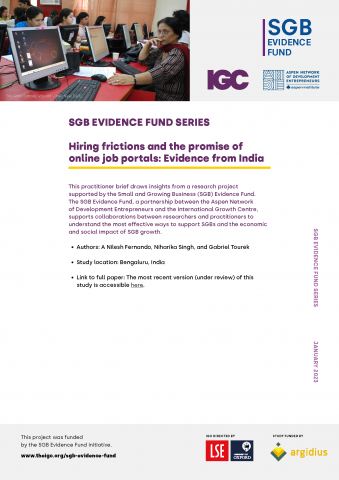Hiring frictions and the promise of online job portals: Evidence from India
This practitioner brief draws insights from a research project supported by the Small and Growing Business (SGB) Evidence Fund.
-
SGB Evidence Fund Series Hiring frictions policy brief
PDF document • 726.7 KB
Firms across the developing world report difficulties in recruiting effective employees. A potential issue is the reliance on traditional recruitment networks — family, friends, existing coworkers, and their referrals. While network-based recruiting limits costs and may better facilitate the monitoring of workers, it may also constrain the quantity and quality of potential hires. This inefficiency in the recruitment process may be particularly consequential for small and medium-sized enterprises (SMEs) in lower-income countries, for whom even marginal improvements in productivity could yield outsized impacts on growth. In developing countries, where SMEs employ large shares of the labour force, firms’ hiring constraints can, by extension, limit the employment opportunities of job seekers.
The authors investigate these constraints in the large urban labor market of Bengaluru, India. Two-thirds of firms in their study sample cite challenges in recruiting suitable workers as an impediment to improving and scaling operations. At the same time, many of these firms primarily recruit through traditional networks. One reason firms value network-based hiring is that it allows them to better assess the trustworthiness of potential hires. Specifically, employers report being quite concerned about employee malfeasances, such as theft or crime. Personal networks offer richer information about the probity of potential hires – as well as a means for sanctioning bad behaviour – that employers value in addition to the qualifications required for a role. Using a randomised field experiment, the authors explore whether an emerging recruitment technology – online job portals – can help to alleviate constraints on hiring among Bengaluru SMEs.




